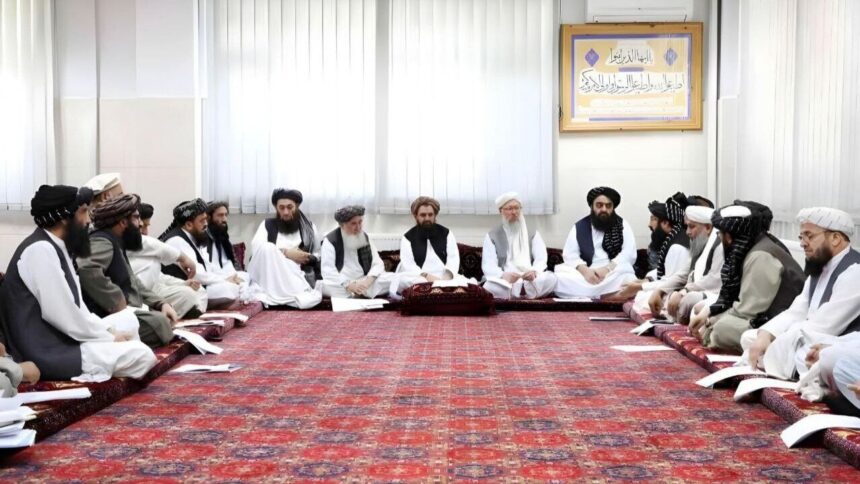RASC News Agency: In a recent statement to the Taliban-controlled Bakhtar News Agency, Mullah Khairullah Khairkhwa, the group’s acting Minister of Information and Culture, declared that the Taliban have “fulfilled all conditions” required for international recognition. He further urged the global community to “accept the current reality in Afghanistan” and take “practical steps” toward normalization. Khairkhwa, who has been sanctioned by the United Nations for his past links to terrorism, cited so-called achievements including the establishment of security, eradication of narcotics production, and the elimination of corruption as proof that the Taliban deserve legitimacy on the world stage. However, these claims not only lack substantiation but also stand in direct contradiction to numerous findings by international organizations, rights groups, and the United Nations.
Most notably, the recent decision by the International Criminal Court (ICC) to issue arrest warrants for senior Taliban leaders, including the group’s top judge and its supreme leader, has starkly highlighted the Taliban’s ongoing crimes against humanity. This legal step welcomed by global rights defenders underscores the undeniable fact that the Taliban are not a legitimate government-in-waiting, but rather a globally isolated and criminalized militia. Despite numerous declarations claiming their commitment to human rights, the Taliban’s record since their return to power in August 2021 is a catalogue of oppression. Women and girls have been banned from secondary and higher education. Female employment in nearly all sectors has been forbidden. Public protests are violently suppressed, and arbitrary detentions, enforced disappearances, and extrajudicial killings are commonplace. Rather than fostering an inclusive government, the Taliban have concentrated power in the hands of a small circle of hardline clerics, silencing all political, ethnic, and sectarian plurality.
Among the Taliban’s most repeated and misleading claims is that they have restored “security” in Afghanistan. Yet, documented evidence by UN monitoring bodies and independent security analysts points to the opposite. Under Taliban rule, Afghanistan has once again become a sanctuary for transnational terrorist groups. The Islamic State-Khorasan Province (ISKP) has carried out multiple deadly attacks in urban centers, while maintaining an active presence in eastern and northern provinces often allegedly tolerated or even indirectly supported by local Taliban elements. Meanwhile, Al-Qaeda’s leadership enjoys sanctuary in Afghanistan, in breach of multiple UN Security Council resolutions. The Pakistani Taliban (TTP) continues to operate from Afghanistan’s soil, launching cross-border attacks. Militant groups such as the Islamic Movement of Uzbekistan, the East Turkestan Islamic Movement, and Ansarullah have also reportedly reestablished themselves under Taliban protection.
In reality, Afghanistan has transformed into a hub for regional militancy, with the Taliban either unable or unwilling to disrupt these terrorist networks. The Taliban’s claims of counterterrorism efforts are therefore viewed internationally as hollow gestures meant to placate rather than protect. Despite Taliban efforts to normalize their rule, including through diplomatic overtures to regional powers such as Russia, the global consensus remains clear: there will be no recognition of the Taliban regime without demonstrable reform. Western governments and major global institutions have repeatedly emphasized that recognition requires:
The formation of an inclusive, representative government;
The restoration of rights for women and minorities; And a verifiable commitment to dismantling terrorist safe havens within Afghanistan’s borders.
Khairkhwa’s claim that Afghanistan is “ready for foreign investment” not only ignores the realities of political instability and legal arbitrariness, but also reflects a deep detachment from the lived experience of millions of Afghans, especially women, who have been driven into poverty, isolation, and fear under Taliban control. One of the few exceptions to international isolation has been Russia’s symbolic recognition of the Taliban. However, foreign policy analysts broadly agree that Moscow’s move is driven not by principle, but by geopolitical calculus. Seeking to reduce Western influence in Central Asia, secure its southern flank, and gain leverage over regional security matters, Russia’s recognition of the Taliban is understood as a tactical maneuver not an endorsement of their governance or respect for human rights.
Russia’s recognition, while politically significant, does not compensate for the absence of international legitimacy. No recognition founded on transactional diplomacy can validate a regime that continues to violate basic human rights, suppress all opposition, and harbor violent extremists. The Taliban’s ongoing attempt to rewrite the international conditions for recognition claiming security, development, and popular support while practicing repression, exclusion, and brutality is both deceptive and dangerous. Their portrayal of Afghanistan as a stable and unified state under responsible leadership is not only inaccurate but an affront to the suffering of its people.
Until the Taliban demonstrate genuine reform through actions, not statements they will remain an isolated, unrecognized regime, presiding over a failed and fractured state. Any effort to legitimize them without such reforms would be a betrayal of the Afghanistani people and a grave setback for international norms and human rights.






